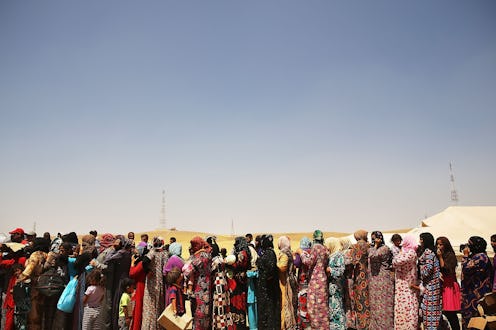News
Has Violence Against Women Decreased In 20 Years?
Twenty years after the Beijing Conference on Women, abuse and discrimination against women has not subsided. A new U.N. report reveals that violence against women is still at "alarmingly high levels" worldwide, with 35 percent of women experiencing some type of violence. Despite the progress achieved for women in education, health, and legal protections, women are still not safe from violence.
In 1995, 189 countries adopted an agenda for the empowerment of women at the U.N.'s World Conference on Women in Beijing that set strategic goals for gender equality in 12 areas including poverty, education, health, work, and violence. Delegates from around the world gathered this week to measure governments' progress since Beijing and decide what still needs to be done. Hillary Clinton, who spoke at the 1995 Beijing conference, will speak to the General Assembly Tuesday.
The U.N.'s assessment of global gender equality since 1995 found that more than 1 in 3 women have experienced physical or sexual violence, or both, in their lifetime and 1 in 10 girls have been forced to have sex before the age of 18. Violence against women is a global issue and plagues countries with different types of governments, religions, and wealth. American universities are struggling with campus rape and sexual assault. Iraqi women are enslaved by jihadists. Nigerian girls abducted by Boko Haram were reportedly sold into slavery and early marriages.
Although the persistence of violence makes it seems like the Beijing conference wasn't very successful, a lot has changed for women worldwide since 1995. Here's a look a what's different.
More Girls in School
Now just as many girls are enrolled in primary school as boys in developing countries, closing the gender gap in primary education. Girls are still disadvantaged in some areas, such as sub-Sahara Africa, but developing regions overall improved significantly.
Less Maternal Deaths
Worldwide deaths due to complications in pregnancy or childbirth fell by 45 percent. Maternal deaths, which are largely preventable, usually occur because of inadequate health care services, according to the U.N. report.
More Gender Equality Laws
As of 2014, at least 143 countries have laws in place to guarantee equality for women and men in their constitutions. Between 2011 and 2013 alone, there were 48 legal changes in 44 countries to further promote equality.
More Women in the Media
Employment of women in the media more than doubled and reporting by women on major topics, excluding science and health, has increased, according to the U.N. report covering 59 countries and 522 news organizations.
Images: Getty Images (4)
